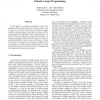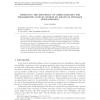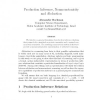1137 search results - page 53 / 228 » Knowledge Representation with Logic Programs |
120
click to vote
ICTAI
2007
IEEE
15 years 8 months ago
2007
IEEE
In this paper we developed an Inductive Logic Programming (ILP) based framework ExOpaque that is able to extract a set of Horn clauses from an arbitrary opaque machine learning mo...
136
Voted
ICLP
2010
Springer
15 years 6 months ago
2010
Springer
Abstract. There is currently a large interest in probabilistic logical models. A popular algorithm for approximate probabilistic inference with such models is Gibbs sampling. From ...
ILP
2004
Springer
15 years 8 months ago
2004
Springer
ILP systems induce first-order clausal theories performing a search through very large hypotheses spaces containing redundant hypotheses. The generation of redundant hypotheses ma...
107
click to vote
AI
2001
Springer
15 years 7 months ago
2001
Springer
The situation calculus is a logical formalism that has been extensively developed for planning. We apply the formalism in a complex multi-agent domain, modelled on the game of Clue...
113
click to vote
AMAI
2004
Springer
15 years 8 months ago
2004
Springer
We introduce a general formalism of production inference relations that posses both a standard monotonic semantics and a natural nonmonotonic semantics. The resulting nonmonotonic...



